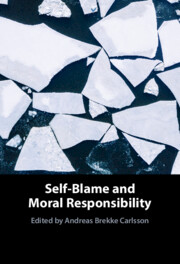Book contents
- Self-Blame and Moral Responsibility
- Self-Blame and Moral Responsibility
- Copyright page
- Contents
- Contributors
- Acknowledgments
- Introduction
- Part I The Nature of Self-Blame
- Chapter 1 The Motivational Theory of Guilt (and Its Implications for Responsibility)
- Chapter 2 The Trials and Tribulations of Tom Brady
- Chapter 3 A Comprehensive Account of Blame
- Chapter 4 A Forward-Looking Account of Self-Blame
- Part II The Ethics of Self-Blame
- Part III Self-Blame and Moral Responsibility
- References
- Index
Chapter 4 - A Forward-Looking Account of Self-Blame
from Part I - The Nature of Self-Blame
Published online by Cambridge University Press: 05 May 2022
- Self-Blame and Moral Responsibility
- Self-Blame and Moral Responsibility
- Copyright page
- Contents
- Contributors
- Acknowledgments
- Introduction
- Part I The Nature of Self-Blame
- Chapter 1 The Motivational Theory of Guilt (and Its Implications for Responsibility)
- Chapter 2 The Trials and Tribulations of Tom Brady
- Chapter 3 A Comprehensive Account of Blame
- Chapter 4 A Forward-Looking Account of Self-Blame
- Part II The Ethics of Self-Blame
- Part III Self-Blame and Moral Responsibility
- References
- Index
Summary
This chapter sets out a non-retributive conception of blame and of self-blame, that is, one that does not invoke the notion of basically deserved pain or harm. To blame is instead to take on a non-retributive stance of moral protest. The reasons for moral protest are forward-looking: moral formation or reconciliation in a relationship that has been impaired due to wrongdoing, protection from wrongdoing, and restoration of the integrity of its victims. Regret, a painful response to one’s own wrongdoing, which by contrast with guilt (by stipulation) does not involve the supposition that the pain it involves is basically deserved, may appropriately accompany self-blame. The pain of guilt, an attitude distinct from regret, conceptually involves basic desert since it involves the supposition that it would be prima facie permissible for those who are appropriately situated to impose it on a wrongdoer for a non-instrumental reason. The pain of regret, by contrast, does not involve this supposition.
- Type
- Chapter
- Information
- Self-Blame and Moral Responsibility , pp. 77 - 94Publisher: Cambridge University PressPrint publication year: 2022
- 5
- Cited by

